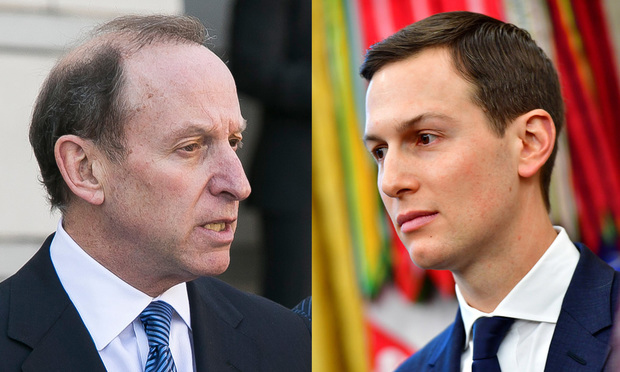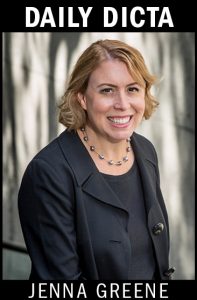An Awkward Moment for Abbe Lowell in Kushner Security Clearance Flap
The Winston & Strawn partner is a top-notch lawyer, a Washington insider with decades of experience working with or against the government at the highest levels. Surely he's familiar enough with security clearance standards to know that the president's son-in-law would face major obstacles in his application.
March 05, 2019 at 10:00 AM
6 minute read
 Left to right: Abbe Lowell and Jared Kushner. Photos: Carmen Natale, Lowell; Bloomberg, Kushner.
Left to right: Abbe Lowell and Jared Kushner. Photos: Carmen Natale, Lowell; Bloomberg, Kushner.
No duh.
That was my reaction to a report by The New York Times last week that President Donald Trump ordered officials to give his son-in-law Jared Kushner a top-secret security clearance.
What I'm having a harder time processing is Abbe Lowell's subtly shifting public statements about the process. The Winston & Strawn partner represents Kushner. Last year, Lowell asserted that Kushner's application “underwent the normal process.” But Lowell is now saying something slightly different—that he “was not aware of nor told of any request for action by the president to be involved in the security clearance process.”
That's a telling distinction. The second statement suggests that perhaps his client neglected to inform him of Trump's intervention—or that Lowell didn't ask.
Lowell did not respond to a request for a comment, and a Winston & Strawn spokeswoman declined comment.
The thing is, it's hardly shocking that Trump might have intervened to get Kushner a clearance. As the president, it's his prerogative to do so.
Unwise? Perhaps. Illegal? No.
 And really, how else was Ivanka's husband going to get a green light, given his initial failure to disclose dozens of contacts with foreign leaders, including the Russian ambassador? Or ties between his family's real estate business and foreign governments and investors?
And really, how else was Ivanka's husband going to get a green light, given his initial failure to disclose dozens of contacts with foreign leaders, including the Russian ambassador? Or ties between his family's real estate business and foreign governments and investors?
Based on my review of dozens of published decisions involving security clearances by the Defense Office of Hearings and Appeals, there was no way—as in zero, zilch, nada—that Kushner would have gotten a top-secret clearance if he was a normal person.
There are multiple reasons why a person might be denied a clearance, but the most relevant factors here would seem to be financial considerations, vulnerability to foreign influence and Kushner's failure to initially disclose all relevant information.
For comparison, let's look back at a case I wrote about before. A 41-year-old mechanical engineer—a U.S. citizen who immigrated from Hong Kong when he was 14—was denied a clearance. Why?
Well, the man visited Hong Kong once to see his dying grandmother, once to attend a relative's wedding, and once to visit family and friends and join a tour group to Taiwan. But the engineer said he thought the question about whether he had contact with “foreign nationals” meant individuals who are affiliated with foreign governments, not his relatives, so he didn't originally list them—though he subsequently provided their names.
That was enough to cost him a security clearance. “An applicant is expected to provide full, frank, and candid answers at every step of the adjudication process,” wrote Administrative Judge Nichole Noel.
Hmmm, so what would Noel make of Jared Kushner? Who according to The New York Times didn't originally disclose meetings with (among others) Sergey Kislyak, the Russian ambassador, and Sergey Gorkov, a graduate of the academy for Russia's main intelligence agency who now heads the state-owned Vnesheconombank?
Are we supposed to believe it's an unacceptable risk to the security of the United States when some engineer didn't list the name of his dying grandmother on his form, but it's fine for Kushner to omit meeting with top Russians?
So look, Kushner has said he mistakenly thought he didn't need to list the meetings because he “served as a point-of-contact for foreign officials trying to reach the president-elect” and somehow that meant these contacts didn't require disclosure.
Even if you accept that excuse (and I'm pretty sure Noel would not), there's still the question of foreign financial influence.
Some examples: According to NBC, Kushner during the transition had contact with individuals from Qatar, Turkey, Russia, China and the United Arab Emirates to discuss securing financing for his family's real estate holdings. In 2017, The New York Times reported that one of Israel's largest financial institutions made a $30 million investment in Kushner Companies. And in 2018, a Canadian asset manager reached a deal to lease the Kushner's overleveraged building at 666 Fifth Avenue in Manhattan for 99 years, prepared to inject $700 million in equity.
The Washington Post even reported that officials in the United Arab Emirates, China, Israel and Mexico have privately discussed ways they can manipulate Kushner “by taking advantage of his complex business arrangements, financial difficulties and lack of foreign policy experience.”
That's a minus if you're debating giving someone access to top-secret information.
By contrast, here's what happens to regular people with overseas financial ties—like a university professor from India who has been a U.S. citizen for years.
His wife (also a U.S. citizen) bought two plots of agricultural property in India for $3,000 for investment purposes, and he invested in $5,000 in two India-based businesses started by a former student.
Because the professor still has family and friends in India, and because he and his wife invested a total of $8,000 there, Administrative Judge Robert Coacher recently denied his clearance. “Applicant has done nothing whatsoever to question his loyalty and devotion to this country. However, he has simply been unable to overcome the heavy burden of showing that he is not subject to influence by India.”
Like I said, it's a different standard for regular people.
Which brings us back to Abbe Lowell.
Lowell is a top-notch lawyer, a Washington insider with decades of experience working with or against the government at the highest levels. Surely he's familiar enough with security clearance standards to know that Kushner would face major obstacles in his application.
Assuming the New York Times report about Trump intervening to get Kushner a clearance is true (and common sense tells me it is), why would Lowell in a statement last year say that Kushner's “application was properly submitted, reviewed by numerous career officials and underwent the normal process”?
Did he really believe that clearance officials magically didn't have a problem with giving Kushner top-secret access? Or did Lowell's client mislead him? Did he mislead the Times?
Either way, the Trump taint may have struck again, snaring yet another lawyer who got too close.
We hope you enjoyed this excerpt from Litigation Daily, the exclusive source for sharp commentary on mega court battles, winning strategies and the issues that obsess elite litigators. Click here to subscribe.
This content has been archived. It is available through our partners, LexisNexis® and Bloomberg Law.
To view this content, please continue to their sites.
Not a Lexis Subscriber?
Subscribe Now
Not a Bloomberg Law Subscriber?
Subscribe Now
NOT FOR REPRINT
© 2025 ALM Global, LLC, All Rights Reserved. Request academic re-use from www.copyright.com. All other uses, submit a request to [email protected]. For more information visit Asset & Logo Licensing.
You Might Like
View All

Processes, Challenges and Solutions In Lateral Partner Integration

Empowering Your Lawyers: A Marketing Team’s Guide to Achieving Goals and Fostering Lawyer Satisfaction
9 minute read
Change Is Coming in the Trump Era. For Big Law, Change Is Already Here
6 minute readTrending Stories
- 1How Alzheimer’s and Other Cognitive Diseases Affect Guardianship, POAs and Estate Planning
- 2How Lower Courts Are Interpreting Justices' Decision in 'Muldrow v. City of St. Louis'
- 3Phantom Income/Retained Earnings and the Potential for Inflated Support
- 4Should a Financially Dependent Child Who Rejects One Parent Still Be Emancipated?
- 5Advising Clients on Special Needs Trusts
Who Got The Work
J. Brugh Lower of Gibbons has entered an appearance for industrial equipment supplier Devco Corporation in a pending trademark infringement lawsuit. The suit, accusing the defendant of selling knock-off Graco products, was filed Dec. 18 in New Jersey District Court by Rivkin Radler on behalf of Graco Inc. and Graco Minnesota. The case, assigned to U.S. District Judge Zahid N. Quraishi, is 3:24-cv-11294, Graco Inc. et al v. Devco Corporation.
Who Got The Work
Rebecca Maller-Stein and Kent A. Yalowitz of Arnold & Porter Kaye Scholer have entered their appearances for Hanaco Venture Capital and its executives, Lior Prosor and David Frankel, in a pending securities lawsuit. The action, filed on Dec. 24 in New York Southern District Court by Zell, Aron & Co. on behalf of Goldeneye Advisors, accuses the defendants of negligently and fraudulently managing the plaintiff's $1 million investment. The case, assigned to U.S. District Judge Vernon S. Broderick, is 1:24-cv-09918, Goldeneye Advisors, LLC v. Hanaco Venture Capital, Ltd. et al.
Who Got The Work
Attorneys from A&O Shearman has stepped in as defense counsel for Toronto-Dominion Bank and other defendants in a pending securities class action. The suit, filed Dec. 11 in New York Southern District Court by Bleichmar Fonti & Auld, accuses the defendants of concealing the bank's 'pervasive' deficiencies in regards to its compliance with the Bank Secrecy Act and the quality of its anti-money laundering controls. The case, assigned to U.S. District Judge Arun Subramanian, is 1:24-cv-09445, Gonzalez v. The Toronto-Dominion Bank et al.
Who Got The Work
Crown Castle International, a Pennsylvania company providing shared communications infrastructure, has turned to Luke D. Wolf of Gordon Rees Scully Mansukhani to fend off a pending breach-of-contract lawsuit. The court action, filed Nov. 25 in Michigan Eastern District Court by Hooper Hathaway PC on behalf of The Town Residences LLC, accuses Crown Castle of failing to transfer approximately $30,000 in utility payments from T-Mobile in breach of a roof-top lease and assignment agreement. The case, assigned to U.S. District Judge Susan K. Declercq, is 2:24-cv-13131, The Town Residences LLC v. T-Mobile US, Inc. et al.
Who Got The Work
Wilfred P. Coronato and Daniel M. Schwartz of McCarter & English have stepped in as defense counsel to Electrolux Home Products Inc. in a pending product liability lawsuit. The court action, filed Nov. 26 in New York Eastern District Court by Poulos Lopiccolo PC and Nagel Rice LLP on behalf of David Stern, alleges that the defendant's refrigerators’ drawers and shelving repeatedly break and fall apart within months after purchase. The case, assigned to U.S. District Judge Joan M. Azrack, is 2:24-cv-08204, Stern v. Electrolux Home Products, Inc.
Featured Firms
Law Offices of Gary Martin Hays & Associates, P.C.
(470) 294-1674
Law Offices of Mark E. Salomone
(857) 444-6468
Smith & Hassler
(713) 739-1250








